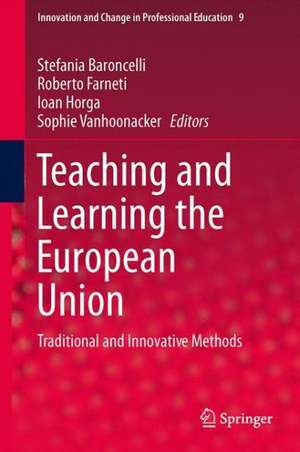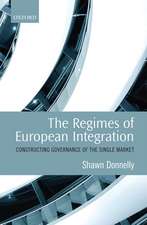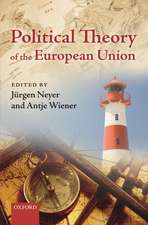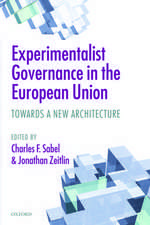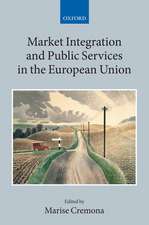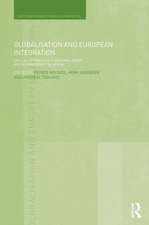Teaching and Learning the European Union: Traditional and Innovative Methods: Innovation and Change in Professional Education, cartea 9
Editat de Stefania Baroncelli, Roberto Farneti, Ioan Horga, Sophie Vanhoonackeren Limba Engleză Hardback – 17 oct 2013
| Toate formatele și edițiile | Preț | Express |
|---|---|---|
| Paperback (1) | 365.21 lei 38-45 zile | |
| SPRINGER NETHERLANDS – 23 aug 2016 | 365.21 lei 38-45 zile | |
| Hardback (1) | 378.64 lei 38-45 zile | |
| SPRINGER NETHERLANDS – 17 oct 2013 | 378.64 lei 38-45 zile |
Din seria Innovation and Change in Professional Education
- 15%
 Preț: 634.49 lei
Preț: 634.49 lei -
 Preț: 358.27 lei
Preț: 358.27 lei - 24%
 Preț: 804.96 lei
Preț: 804.96 lei - 18%
 Preț: 947.18 lei
Preț: 947.18 lei - 24%
 Preț: 689.09 lei
Preț: 689.09 lei - 18%
 Preț: 1334.36 lei
Preț: 1334.36 lei - 18%
 Preț: 898.58 lei
Preț: 898.58 lei - 18%
 Preț: 1014.76 lei
Preț: 1014.76 lei - 18%
 Preț: 948.29 lei
Preț: 948.29 lei -
 Preț: 391.02 lei
Preț: 391.02 lei - 15%
 Preț: 642.51 lei
Preț: 642.51 lei - 18%
 Preț: 1123.98 lei
Preț: 1123.98 lei - 15%
 Preț: 642.36 lei
Preț: 642.36 lei - 15%
 Preț: 634.32 lei
Preț: 634.32 lei - 15%
 Preț: 636.80 lei
Preț: 636.80 lei - 18%
 Preț: 778.13 lei
Preț: 778.13 lei - 15%
 Preț: 640.71 lei
Preț: 640.71 lei - 15%
 Preț: 639.73 lei
Preț: 639.73 lei
Preț: 378.64 lei
Nou
Puncte Express: 568
Preț estimativ în valută:
72.45€ • 75.65$ • 59.96£
72.45€ • 75.65$ • 59.96£
Carte tipărită la comandă
Livrare economică 31 martie-07 aprilie
Preluare comenzi: 021 569.72.76
Specificații
ISBN-13: 9789400770423
ISBN-10: 9400770421
Pagini: 210
Ilustrații: VIII, 248 p. 14 illus., 12 illus. in color.
Dimensiuni: 155 x 235 x 22 mm
Greutate: 0.54 kg
Ediția:2014
Editura: SPRINGER NETHERLANDS
Colecția Springer
Seria Innovation and Change in Professional Education
Locul publicării:Dordrecht, Netherlands
ISBN-10: 9400770421
Pagini: 210
Ilustrații: VIII, 248 p. 14 illus., 12 illus. in color.
Dimensiuni: 155 x 235 x 22 mm
Greutate: 0.54 kg
Ediția:2014
Editura: SPRINGER NETHERLANDS
Colecția Springer
Seria Innovation and Change in Professional Education
Locul publicării:Dordrecht, Netherlands
Public țintă
ResearchCuprins
1. Introduction - Teaching European Studies: Educational Challenges.- PART I – EUROPEAN STUDIES: CONTEXTS AND CHALLENGES.- 2. Shaping the New Professional for the New Professions; W.H. Gijselaers, A. Dailey-Hebert and A.C. Niculescu.- 3. Working at the EU Institutions: New Human Resources Selection Strategy; N.D. Bearfield.- 4. Educating for EU Citizenship and Civic Engagement through Active Learning; G. J. van Dyke.- 5. Multilingual Universities: Policies and Practices; R. Franceschini and D. Veronesi.- 6. Thinking Europe: A Canadian Academic Immersion inside the European Institutions - EU Study Tour and Internship Program; E. Lavalle and A. Berlin.- PART II – MAPPING INNOVATIONS IN TEACHING AND LEARNING.- 7. Mapping Innovative Teaching Methods and Tools in European Studies: Results from a Comprehensive Study; S. Baroncelli, F. Fonti and G. Stevancevic.- 8. Innovativeness in Teaching European Studies: an Empirical Investigation; F. Fonti and G. Stevancevic.- 9. Linguistic Pluralism in European Studies; S. Baroncelli.- PART III – INNOVATIVE TEACHING AND EARNING IN EUROPEAN STUDIES.- 10. Assessing EU Simulations: Evidence from the Transatlantic EuroSim; R. Jones and P. Bursens.- 11. Distance Learning as an Alternative Method of Teaching European Studies; N. Timus.- 12. Problem Based Learning in European Studies; H. Maurer and C. Neuhold.- 13. Finding the Right Mix? Teaching European Studies through Blended Learning; A. Mihai.- 14. The Network is the Message: Social Networks as Teaching Tools; R. Farneti, I. Bianchi, T. Mayrgündter and J. Niederhauser.- Biographies.- Index.
Recenzii
“In a commendable format, the book addresses those involved or about to engage in the instructional design and teaching of European Studies. … The lengths of chapters were ideal for reading, well-structured with regards to the information they provided. … Those interested in the history and evolution of European Studies programmes should consider reading the introduction by Baroncelli, Farneti and Vanhoonacker. … the book assembles a variety of topics, perspectives and approaches within the realm of European Studies’ pedagogy.” (Sophie Wulk, Journal of Contemporary European Research, Vol. 12 (4), 2016)
“This ground-breaking book makes an original contribution to our knowledge of how the European Union is taught by systematically mapping and analyzing the broad range of teaching methodologies utilized. … I found the book stimulating and thought-provoking. It is an excellent work that also serves as a useful model for how to conduct high quality pedagogic research in European Studies.” (Simon Lightfoot, Journal of Common Market Studies, Vol. 53 (2), 2015)
“This ground-breaking book makes an original contribution to our knowledge of how the European Union is taught by systematically mapping and analyzing the broad range of teaching methodologies utilized. … I found the book stimulating and thought-provoking. It is an excellent work that also serves as a useful model for how to conduct high quality pedagogic research in European Studies.” (Simon Lightfoot, Journal of Common Market Studies, Vol. 53 (2), 2015)
Textul de pe ultima copertă
This volume examines the EU’s changing educational context and its challenges. Based on an extensive survey of more than 2000 European Studies courses in 30 European countries, it maps and analyses the features of teaching methodologies as they emerge from both disciplinary as well as interdisciplinary curricula. It presents a series of case studies on some of the most-used innovative teaching tools emerging in the field such as simulation games, e-learning, problem based learning, blended learning, and learning through the use of social networks. Based on the contributors’ own experiences and academic research, the book examines both strengths and possible pitfalls of these increasingly popular methods. The book’s critical approach will inspire educators and scholars committed to improving the teaching methods and tools in the area of European Studies and other programmes of higher education facing similar challenges.
Caracteristici
An original contribution to the expanding field of teaching and learning methods The first systematic attempt to map and analyse the broad range of teaching methodologies in the growing field of European Studies Highly relevant for any educator or scholar taking the ‘learning to learn’ paradigm seriously
